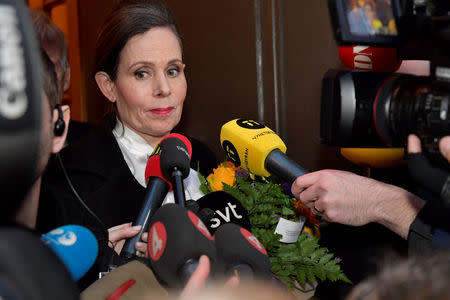Explainer: Nobel Prize-awarding Swedish Academy weighs reforms after controversy

STOCKHOLM (Reuters) - A row has erupted within the secretive committee that awards the Nobel Prize in Literature over sexual harassment allegations and alleged leaks of prize winners' names, prompting a rare intervention in public life by Sweden’s king.
King Carl XVI Gustaf said this week that he may consider reforming the Swedish Academy, established in 1786 by his forebear Gustav III. The committee's selections fascinate and often baffle literature lovers the world over.
For instance, the award to American troubadour Bob Dylan in 2016 sharply divided opinion over whether a popular musician should be given an award that had been largely the domain of novelists and playwrights.
Below are key elements of the fight and what it could mean for the Academy and the Nobel prize.
WHAT SPARKED THE CRISIS?
At heart of the row are allegations of sexual assault and harassment against several women by Jean-Claude Arnault, a photographer and well-known cultural figure in Sweden. In an article by Swedish daily Dagens Nyheter in November, 18 women levelled the accusations against Arnault, who is the husband of poet and Academy member Katarina Frostenson.
Arnault and Frostenson have run a cultural club in Stockholm which the Academy has in the past helped to finance.
Arnault's lawyer Bjorn Hurtig told Reuters on Thursday that his client denied all the allegations, including that of being the source of leaks.
State prosecutors opened a preliminary investigation into the sexual misconduct allegations, but said last month the probe into assaults alleged to have been committed between March 2013 and April 2015 had been shelved due to a lack of evidence and the statute of limitations having passed for some of the incidents.
Prosecutor Christina Voigt told Reuters on Friday a preliminary investigation concerning Arnault was still underway, but declined say how many alleged incidents were being investigated.
The Academy severed ties with Arnault in November after the allegations of sexual misconduct became public.
Dagens Nyheter reported that a separate internal investigation by the Academy alleged that Arnault had leaked the closely-guarded names of Nobel prize winners on seven different occasions. The paper said that included Bob Dylan in 2016 as well as French author Jean-Marie Gustave Le Clezio in 2008 and British playwright Harold Pinter in 2005.
The Academy confirmed to Reuters it hired a law firm to conduct an internal investigation whose findings haven't been made public. The Academy declined to elaborate further.
HOW IS THE ACADEMY DIVIDED?
The Permanent Secretary of the Academy, Sara Danius, stepped down after a crisis meeting on Thursday. Frostenson also withdrew.
"I am leaving the Academy as permanent secretary. It was the will of the Academy that I should leave my role," Danius told reporters late on Thursday. "It feels pretty good."
The Swedish Academy said in a statement Frostenson had decided to leave the body "in the hope that it will survive as an institution".
Their departures followed those of three other members of the 18-seat Academy, Peter Englund, Kjell Espmark and Klas Ostergren, who pulled out in protest over the handling of the crisis. Englund and Espmark both declined to comment on the row on Friday, while Ostergren did not respond to requests for comment.
The three had lost a vote to exclude Frostenson from the committee for allegedly breaching conflict of interest rules and divulging names of prize winners to her husband, who could then leak them.
In an open letter in daily Svenska Dagbladet, eight other Academy members said they had voted against excluding Frostenson on the grounds that the evidence, some of it anonymous witness accounts, was insufficient to prompt such action.
Frostenson has so far not commented publicly on the vote and accusations against her.
Frostenson's publisher has referred requests for comment by her to the Swedish Academy which supplied Frostenson's email address. Reuters has repeatedly sought comment from Frostenson via email but received no reply.
WHAT COULD THE CONSEQUENCES BE?
The board of the Nobel Foundation, which manages the assets bequeathed in the will of dynamite inventor and philanthropist Alfred Nobel, has said it is following developments at the Academy with great concern.
"We can see that the trust in the Swedish Academy has been seriously damaged. It is not yet clear how this situation may tarnish the Nobel Prize's reputation," it said in a statement.
Danius said that the public mud-slinging had already affected the reputation of the Nobel Prize. Some sounded a more optimistic note, saying the Academy will eventually be able to emerge from its troubles.
"We are trying to reconstruct the Academy from within. It's a very big task, but I think we will manage it," Academy member Anders Olsson, as of Friday the body's temporary permanent secretary, said on Swedish public service radio.
Still, the loss of members leaves the committee at a crossroads.
Appointments to the Academy are for life and there is no formal provision under the its arcane rules for members to resign. That means those who withdraw cannot be replaced.
Rules also stipulate that a minimum of 12 votes are needed to select new candidates. Only 11 members are currently active following the recent withdrawals.
King Carl XVI Gustaf, who is the formal patron of the Academy, said reforms to the body might be in store, including giving members the right to resign.
Political leaders have urged the Academy to resolve the crisis amid warnings about the impact on Sweden's image abroad. Swedish Prime Minister Stefan Lofven said he was surprised by the verbal abuse levelled by members at each other.
"This is an issue for Sweden," he said. "It is important that people have faith and respect for the Academy."
(Reporting by Niklas Pollard and Simon Johnson; additional reporting by Olof Swahnberg, Johan Sennero and Anna Ringstrom; Editing by Nick Tattersall)

